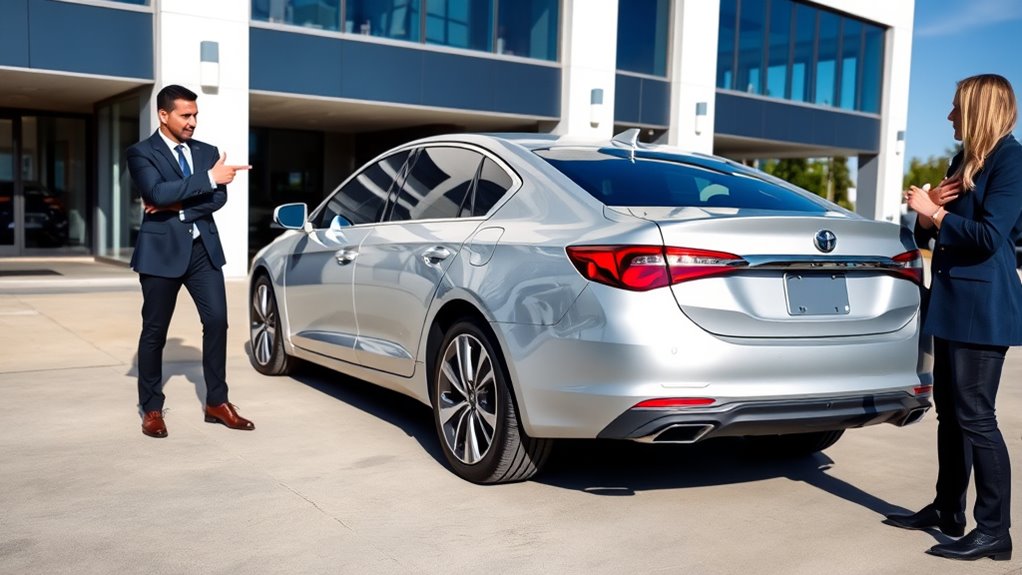When trading in a salvage-title vehicle, most lessors and dealerships tend to refuse due to the vehicle’s history of extensive damage or theft recovery. They often avoid salvage titles because they lower the vehicle’s value and pose higher risks for resale and financing. Proper repairs and rebuilds might increase acceptance chances, but many still prefer clean titles. To understand what factors influence acceptance and how to improve your odds, consider exploring more details ahead.
Key Takeaways
- Most lessors refuse salvage-title vehicles due to higher risk and lower resale value.
- Properly rebuilt salvage cars that pass inspections may be accepted but often at a reduced trade-in value.
- Extensive damage or incomplete repairs typically lead to rejection by lessors.
- Salvage titles can severely limit financing options and leasing opportunities.
- Vehicle history and rebuild documentation are crucial in determining acceptability for trade-ins.

If you’re considering trading in a vehicle with a salvage title, it’s important to understand what that means for your transaction. Salvage titles are issued when a vehicle has been declared a total loss by an insurance company, usually because of significant damage or theft recovery. This label can complicate how lessors or dealerships evaluate your car, especially when it comes to insurance claims and vehicle valuation. Lessors typically have strict policies about accepting salvage-title vehicles because they tend to be worth less and pose higher risks.
Trading in a salvage-title vehicle can complicate valuation and acceptance by lessors and dealerships.
When you trade in a salvage-title vehicle, its history influences what lessors will consider. Insurance claims play a major role here because they reveal the extent of damage and whether repairs were properly documented. If the vehicle has a history of multiple claims or extensive repairs, it signals to lessors that the vehicle might have underlying issues, which can affect their willingness to accept it. moreover, insurance claims influence the vehicle’s valuation, often lowering its market worth considerably. This reduced valuation impacts your trade-in value, meaning you might not get as much credit toward a new purchase or lease.
Additionally, the vehicle’s repair history and whether it was properly rebuilt after an accident significantly influence acceptance. Lessors and dealerships are cautious because salvage titles complicate the vehicle’s resale prospects. Many won’t accept salvage-title trade-ins at all, especially if the damage was severe or the vehicle was rebuilt after an accident. They prefer vehicles with clean titles, which are easier to resell and typically carry higher market value. Some lessors may accept salvage vehicles if they have been properly rebuilt and pass inspection, but even then, they might assign a lower trade-in value to offset the added risk.
Furthermore, the impact of a salvage title extends beyond initial acceptance. It can limit your options for financing or leasing, as many lenders are hesitant to finance vehicles with such histories. This aspect underscores the importance of understanding how insurance claims and vehicle valuation tie into the process. If your vehicle’s value is considerably diminished due to its salvage status, you may find yourself in a less favorable position when negotiating a trade-in deal. Being aware of vehicle valuation factors can help you better understand your options and potential outcomes.
Frequently Asked Questions
Are Salvage-Title Trade-Ins More Affordable for Lessees?
Salvage-title trade-ins tend to be more affordable upfront because of their salvage history, which lowers resale value. As a lessee, you might save on initial costs, but keep in mind that the vehicle’s salvage history can lead to higher insurance premiums and limited resale options later. While the lower price seems attractive, weigh the potential ongoing costs and resale value decline before deciding if it’s a good deal for you.
How Do Salvage Titles Affect Lease Terms and Conditions?
Oh, the irony! Salvage titles might seem like a deal, but they often complicate your lease terms. You’ll face stricter vehicle valuation assessments and resale restrictions, meaning less flexibility and potentially higher costs. Lessors typically tighten conditions because they worry about future resale value. So, while you might save upfront, these salvage titles could limit your options and increase your lease’s complexity, making it less of a bargain in the long run.
Can a Salvage-Title Vehicle Be Leased Again After Repairs?
You can lease a salvage-title vehicle after repairs if it meets repair standards and passes a salvage valuation assessment. Lessors typically require detailed documentation showing the vehicle’s restoration aligns with safety and quality standards. If the repairs are thorough and the salvage valuation confirms the vehicle’s value, leasing becomes possible. However, be prepared for higher interest rates or stricter lease terms due to the vehicle’s salvage history.
What Warranties Are Available for Salvage-Title Trade-Ins?
Did you know that only about 15% of salvage-title vehicles come with warranties? When considering salvage-title trade-ins, you should know that warranties are limited and often depend on the vehicle’s history and repairs. Some insurers may refuse coverage if there are previous insurance claims or extensive damage. Always review the vehicle history carefully, as warranties typically won’t cover pre-existing issues from past insurance claims or prior damage repairs.
Do Insurance Companies Treat Salvage-Title Vehicles Differently?
Insurance companies often treat salvage-title vehicles differently because of their lower vehicle valuation and increased risk. When you file insurance claims, they typically assign a reduced value to salvage titles, which affects payout amounts. This impacts your options for coverage and resale. You should be aware that some insurers may refuse coverage altogether, so understanding how salvage titles influence insurance treatment helps you make informed decisions about insuring and valuing your vehicle.
Conclusion
When considering salvage-title trade-ins, remember that lessors value honesty, transparency, and proper documentation. They want clarity, not confusion; they seek certainty, not ambiguity. By providing accurate information, maintaining transparency, and understanding their requirements, you build trust and increase your chances of a successful trade-in. Be straightforward, be prepared, and be proactive. Because when you’re honest, when you’re prepared, when you’re transparent, you set yourself up for a smoother, more favorable outcome.










